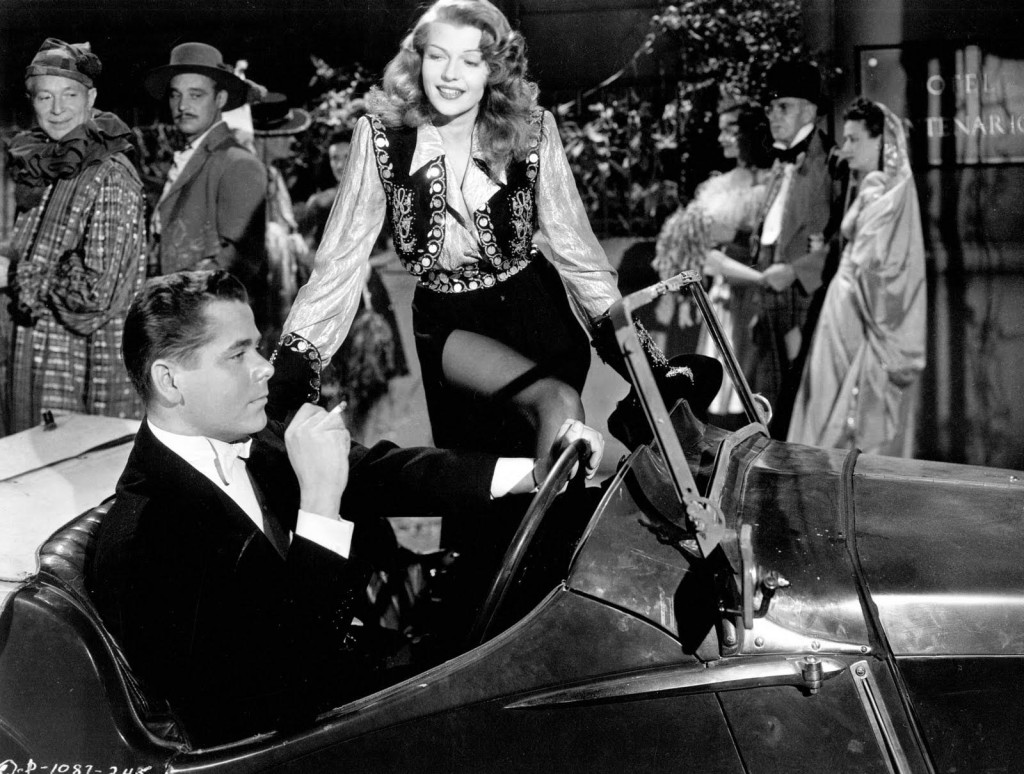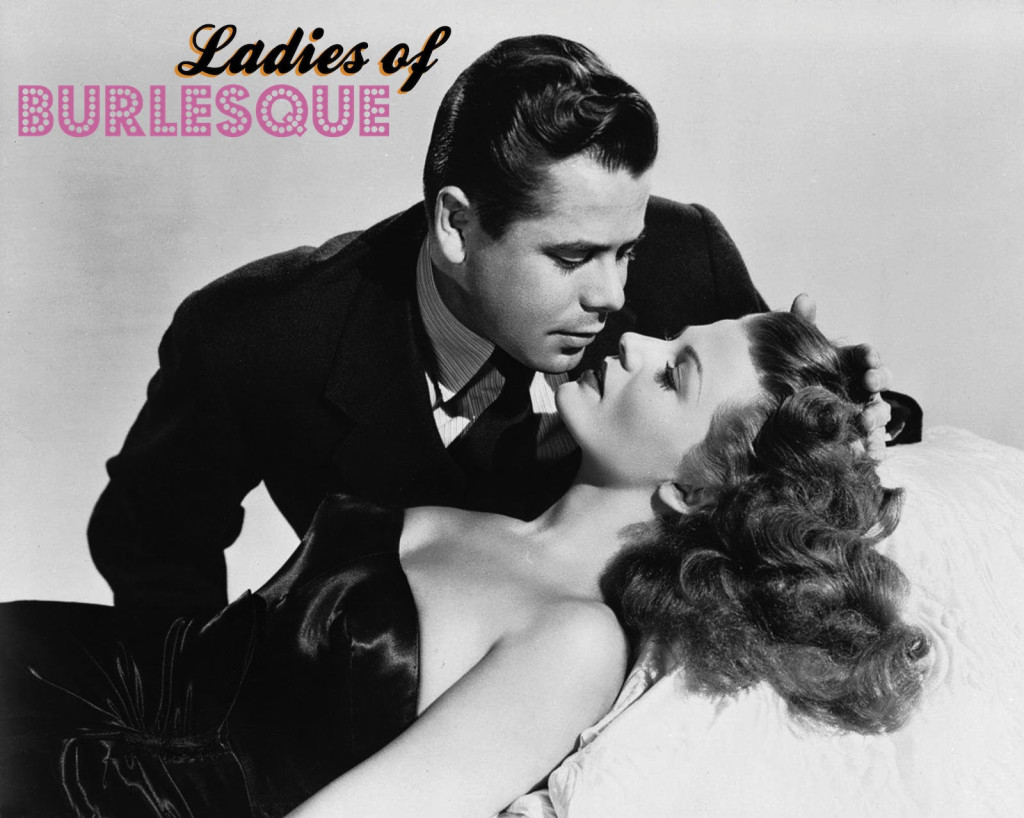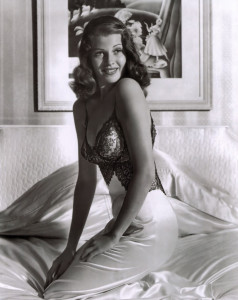Reviews include Irena’s Vow, The Beast, and Before I Change My Mind.
INTERVIEW: Alicia Fletcher and the Ladies of Burlesque
January 26, 2016

“Men fell in love with Gilda, but they wake up with me,” said Rita Hayworth in reference to the 1946 drama that turned her from an ingénue to the most lusted-after-movie star in America. As the femme fatale who gleefully torments her ex-lover Johnny (Glenn Ford), Hayworth wiggled her way into America’s postwar psyche; the name “Gilda” entered the sexual lexicon as a signifier of bombshell beauty (to the point that the US Army named a test atomic blast in her honour). In films as varied as The Bicycle Thief and The Shawshank Redemption, the image of Hayworth as Gilda as been used to symbolize erotic yearning.
On January 27, Gilda screens at the Royal Theatre in Toronto as the kick-off to a new screening series created and curated by Alicia Fletcher, the Digital Co-Ordinator at TIFF’s Film Reference Library and an instructor at Ryerson University. Fletcher, who has an MA in Cinema Studies from U of T, has spent the last few years programming silent films at the Revue Cinema, but this new series, entitled “Ladies of Burlesque,” is quite unique. In addition to showing films that include burlesque performances in their storylines – as in Hayworth’s indelible strip-tease to the tune of “Put the Blame on Mame” in Gilda – Fletcher has coordinated live performances by members of Toronto’s burlesque community, including Dolly Berlin, transforming rep cinema programming into a more interactive event.
Adam Nayman: What was the organizing principle for your screening series?
Alicia Fletcher: The series is about these small musical performances – not in musical films, but musical performances within films – which are risqué and scandalous, and which celebrate and complicate female sexuality in film.

It’s interesting that you’re starting with Gilda, which is not a very old movie; there must be other examples of burlesque in cinema before it came out in the mid-40s.
The title of the series is “Ladies of Burlesque,” and there is actually a movie called Lady of Burlesque. But I purposely chose something else. For me, Gilda was the film that made me realize the subtleties of sex scenes. It was made in 1946, and if you look at the history of burlesque in the United States, it’s the year that burlesque started getting killed off as a performance art. In New York, you had Mayor LaGuardia cleaning up these risqué shows, which were hangovers from the vaudeville era. The theatres that had burlesque shows and which were homes for performers like Gypsy Rose Lee – those are all getting shut down. They’re essentially raided. So burlesque starts moving into Hollywood. Gypsy Rose Lee starts showing up in movies. And I think Gilda is poised right at that point where the form starts to explode [in movies].
It’s interesting that the burlesque aspect is very self-contained in Gilda, which is really sort of a film noir – or maybe a tragic romance.
The whole love story in Gilda is subversive. The two characters hate each other more than they love each other. At that point, Rita Hayworth had only done these very innocent, peachy-keen roles, she’d been in movies with Fred Astaire. She was famous for stuff like Cover Girl and Tonight and Every Night. In Gilda, she explodes. It’s incredible. She’s a bad girl, but she’s also vulnerable; she’s sexy, but she’s also a bit grotesque, especially when she does “Put the Blame on Mame,” because she’s sort of wasted when she does it. She’s on the dance floor, she’s trying to make somebody angry, she’s desperate. All she does is strip off one glove and a necklace. It’s a lot less skin than in some of the other films in this programme, but it’s still the definition of burlesque.
Was Gilda very controversial when it came out?
Lady of Burlesque is based on a book called The G-String Murders, which is by Gypsy Rose Lee. The film was directed by William Wellman, and it stars Barbara Stanwyck, and it was hugely censored when it came out in the 1940s. It’s very tame. Gilda got away with more. The censors were concerned about the film, but because it’s also suggested and innuendo, they got away with it. In the screenplay it says she takes off her necklace and throws it into the audience, which isn’t a big deal. Following that with the line “I’m not very good with zippers unless I have some help,” though – that’s a bit more shocking. But they got it through.
What was at stake for Rita Hayworth playing this sort of character?
She was the top box office draw in America at that point and had been for two years. It’s interesting to think about what she was going through in her personal life at that time. She’s married to Orson Welles, and we only really have his side of the story, but it’s supposedly a very tumultuous relationship. She’s just had her daughter Rebecca. Their marriage is going to end a year later, after the release of Gilda. Her life is sort of on the rocks. But the relationship that’s really on the rocks is her friendship with Harrry Cohn, who runs Columbia. The way she described it in interviews was that he exploited and abused her to a ludicrous degree. So Gilda is interesting in that her character is there to punish men. Even though she also sort of fails there, too; she’s in love with the person she tries to punish, and he marries her to make her feel terrible about herself. There’s some mirroring of her personal and professional life there, for sure.
The film ends with the characters together, as if it can’t quite reconcile the subversiveness of the story with the form of a mainstream entertainment…
It’s just after World War II, and it’s a time when Hollywood is all about putting women in their place. They need to be at home when the soldiers get back. The ending of Gilda isn’t necessarily happy – it ends with somebody getting stabbed in the back. What are the chances of these two people being happy? He’s laid his hands on her? He hits her. She’s drinking. It’s not good.
Do you think Gilda’s reputation is too precious or “soft” considering the kind of movie that it is?
People know the image of that poster. That was probably my first exposure to Gilda. It was the poster in The Shawshank Redemption, which I saw when I was ten. I didn’t know who Rita Hayworth was at that point. I would have had no idea.

In a way, that poster defined her entire career.
She comes from a long line of dancers, though. Her father trained her, and he was the inventor of some pretty scandalous dances, too. She was performing from the age of ten in Tijuana. In some pretty scary bars. She came up in a circuit where burlesque was on the same bill.
Is Gilda a beloved movie in burlesque circles?
I wouldn’t say that its following is specific to the burlesque scene. But a lot of the people who do burlesque in Toronto have great taste, and they recognize how great Gilda is, and how great Rita Hayworth is. I can’t speak for all of them. I’m not a member of that community, really. I’ve gone to a lot of burlesque shows, and I’ve enjoyed them, and I thought that some of the events I’ve attended could easily be related to films or film screenings. When I talk to performers and I say “Gilda” their faces light up. They love what a man-eater she is. And they love the strip tease in the film.
What’s Dolly Berlin going to do at the screening? Has it all been planned out?
I’m giving the performers a chance to dictate what they want to do. Dolly is going to be doing “Put the Blame on Mame” in a costume that is Rita Hayworth-inspired. That’ll be before the screening. The film will come afterwards.
Is the rest of the series locked? Have you thought about how each individual programme is going to look?
This is the soft launch. Everything is going to be happening for the first time – lighting, sound, and everything else. It’s not something that the Royal has really done before. I definitely have an idea of which performer I want for each film, or at least the first three or four films.
There really isn’t much programming like this in Toronto. I wonder why it’s not more common to mix presentation styles this way.
I could be wrong, but I don’t think that there’s anybody who’s done a dedicated, burlesque film series like this. There have been shadow-casts, which is different. For instance, I saw Jurassic Park at the Bloor, with Alex Woodside literally burlesquing as a dinosaur. What we’re doing is a little different, but both forms are celebratory. The definition of burlesque, if you follow it back to the 17th Century, is very confusing. It can mean mockery, it can mean satire. Is Dolly Berlin mocking Gilda? Of course not. I think what ties this series to the programming I do at the Revue is trying to go back to an earlier form of exhibition, where films are shown alongside other kinds of live performances. That’s something I’ve always wanted to hearken back to. I like providing a condition of viewing that involves other senses. For silent movies, that means live musical accompaniment. You get something special from having a piano in the theatre, or a synthesizer. For burlesque, it’s even more senses.
I feel like Toronto’s film community is sort of an uptight bunch.
Yes. They’re very hard to please and careful about how they spend their money. They want to see stuff that they know they’re going to like. I’m not sure what to expect. Some people will come to this screening because they love Gilda, and they may not want to see a burlesque performance. Some people will come to see Dolly Berlin, because she’s a big name, and they may not want to see Gilda. What I’m hoping is that both sets will be won over by the secondary component.
Is there room to include some contemporary films along the way? Like, maybe Showgirls?
Without revealing the dozens of titles that I’ve been looking at over the last year, I can say that it does go all the way into the 90s. For an obvious reason, and maybe you can guess that particular movie. But you know, there’s also films like Cabaret, or Staying Alive. I want to incorporate some “boy-lesque,” for sure. I’ve seen more boy-lesque than burlesque.
Did you like Magic Mike XXL?
I like Magic Mike XXL. It definitely coincides with my ideas for this programme. A lot of my friends who are male film critics like the movie. I think the movie vindicates them somehow: men who have feelings and emotions and insecurities and who want to express themselves, to see that all onscreen.



